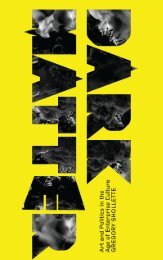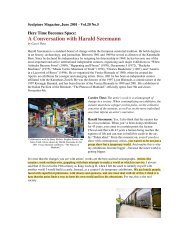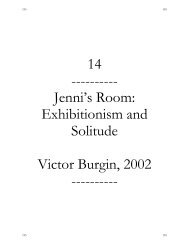Untitled
Untitled
Untitled
Create successful ePaper yourself
Turn your PDF publications into a flip-book with our unique Google optimized e-Paper software.
Privatizations<br />
as rights were concerned—as in the Wild West era in the United States—<br />
and had to be restructured. That is to say, they had to be parceled, distributed,<br />
and opened up to privatization, following rules that neither existed nor<br />
could exist. The process of de-Communization of the formerly Communist<br />
Eastern European countries may thus be seen as a drama of privatization<br />
that naturally played out beyond all the usual conventions of civilization. It<br />
is well known that this drama kindled many passions and produced many<br />
victims. Human nature, which had previously been suppressed, manifested<br />
itself as raw violence in the struggle over the private acquisition of collective<br />
assets.<br />
This struggle should not, however, be understood as simply a transition<br />
that leads (back) from a society without private property to a society<br />
with private property. Ultimately, privatization proves to be just as much<br />
an artificial political construct as nationalization had been. The same state<br />
that had once nationalized in order to build up Communism is now privatizing<br />
in order to build up capitalism. In both cases private property is subordinated<br />
to the raison d’état to the same degree—and in this way it manifests<br />
itself as an artifact, as a product of state planning. Privatization as a<br />
(re)introduction of private property does not, therefore, lead back to nature—<br />
to natural law. The post-Communist state is, like its Communist predecessor,<br />
a kind of artistic installation. Hence the post-Communist situation is<br />
one that reveals the artificiality of capitalism by presenting the emergence of<br />
capitalism as a purely political project of social restructuring (in Russian:<br />
perestroika) and not as the result of a “natural” process of economic development.<br />
The establishment of capitalism in Eastern Europe, including<br />
Russia, was indeed neither a consequence of economic necessity nor one of<br />
gradual and “organic” historical transition. Rather, a political decision was<br />
made to switch from building up Communism to building up capitalism,<br />
and to that end (in complete harmony with classical Marxism) to produce<br />
artificially a class of private property owners who would become the principal<br />
protagonists of this process. Thus there was no return to the market as a “state<br />
of nature” but rather a revelation of the highly artificial character of the<br />
market itself.<br />
For that reason, too, privatization is not a transition but a permanent<br />
state, since it is precisely through the process of privatization that the private<br />
discovers its fatal dependence on the state: private spaces are necessarily







